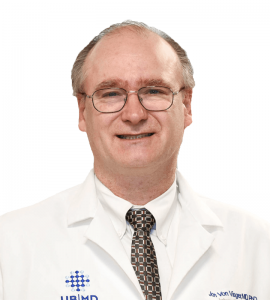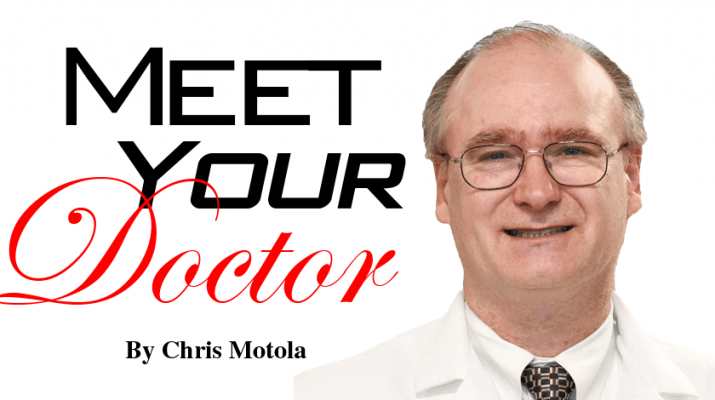New transplant director wants to expand transplantation program at ECMC
By Chris Motola

Q: What brought you to Buffalo and Erie County Medical Center?
A: I’d been doing nephrology and transplants down at Ohio State for the last 13 years or so, and saw this as an opportunity to grow as a physician. As a director [of Regional Center of Excellence for Transplantation and Kidney], I’m still practicing in the clinical group. There are four of us in terms of transplant nephrologists.
Q: Kidney transplants are one of the more common and successful types of transplants. Why is that?
A: As a solid organ transplant, it’s by far the most common transplant in the US, somewhere between 10,000 and 12,000 transplants annually. In terms of survival, first year survival rates are above 95 percent, so it’s quite successful. Liver transplant also does pretty well. Other solid organ transplants — heart, lungs — have a much higher mortality rate.
Q: Why do kidney transplants have such a high success rate?
A: A few things. Back in the ‘70s, Medicare started providing support for dialysis in addition to transplants, so for kidneys, as opposed to heart and lung, there’s this bridging therapy that people use. It doesn’t replace all the organ functions, but it does provide the maintenance of fluids and electrolytes that help you avoid mortality. So even though the mortality rate is higher on dialysis than with a transplant, patients can survive on dialysis for decades. So, it’s a bridging therapy to get them to the transplant. If we can, we like to get referrals for patients even before they’re on dialysis so they’ll be healthier for their transplant. The other side of the coin is the availability of the organs themselves. From a technical perspective, it’s less complicated than a heart, or a lung, or a liver, so we tend to be more successful in retrieving deceased donor organs and also for living donors, which is optimal. Most of us are born with two kidneys, but there’s a lot of evidence that you do just fine with one. So, you get friends, family and even altruistic donors who can offer the organ.
Q: Are kidney donors at risk?
A.: They go through a pretty stringent process to see if they’re a healthy kidney donor. Post donation kidney health is usually quite good. There’s a rare circumstance where kidney donors do develop kidney disease or failure after donation, but donors who have made the sacrifice and don’t have a living donor of their own get priority for getting a diseased-donor transplant.
Q: What are the common causes of kidney failure?
A: By far in the United States are diabetes and hypertension. With hypertension we’re less sure if it’s causing patients’ kidney failure or if it presents along with kidney failure and is caused by something else. So, it’s hypertension-associated. It may be hypertension is a primary or secondary cause. FSGS (focal segmental glomerulosclerosis) is becoming more common in the U.S., which is the progressive scarification of the kidney filters. And a significant number of patients with autoimmune diseases, and some with congenital kidney diseases.
Q: I saw you also had some background in nerve regeneration research?
A: I had been interested in the regeneration of tissues in general and, when I was doing my medical school training, I was heavily clinically involved as a matter of practice. The advances in neurological recovery and treatment has just been much, much slower than other areas, so I changed my pursuits. I do keep abreast of developments in that area, but it was not satisfying for me to pursue, so I switched over to nephrology and the immune system.
Q: Do you do a lot of direct outreach to donors?
A: I do. We do have some of our administrators here who help direct our outpatient clinics as well as going to dialysis centers to speak to potential candidates for transplant and to provide education. We have organizational meetings with the local procurement programs and help make sure they understand our criteria and processes. A fair number of our patients will transition back from our outpatient clinics post-transplant so they’ll have collateral support.
Q: What kind of impact do you want to have on the department at ECMC?
A: It’s an underserved area here, so outreach is a part of that. We’d really like to grow the program. So this is one of the shortest wait lists in the country. We’re regularly bringing in patients to transplant, and they’re not on the list very long. There are other avenues we’d like to expand; we’d like to do clinical trials and studies that will help improve the outcomes of transplant.
Q: How do you keep the wait list so short?
A: Well, being not only just more available, some programs turn down offers pretty regularly, whether it’s due to staffing issues or selectivity, what we’d often call “cherry-picking.” The more recently adopted kidney allocation program in the last years really is directed at efforts to expand organ acceptance and organ placement to recipients for whom they’re more appropriate, and discarding fewer organs.
In the News
Physician Jon VonVisger was recently appointed primary nephrologist and medical director at the Regional Center of Excellence for Transplantation and Kidney Care at ECMC. VonVisger completed combined medical and Ph.D. degrees at the University of Maryland, School of Medicine in Baltimore in 1996 with doctoral work on central nervous system regeneration and nerve growth factors. He went on to complete an internal medicine residency in the University of Maryland Medical System. He is specialty trained in nephrology and transplant medicine through Harvard, Massachusetts General and Brigham and Women’s hospitals. VonVisger also practiced transplant nephrology at The Ohio State University (OSU) Comprehensive Transplant Center in Columbus, one of the 10 largest transplant centers in the United States, from 2005 to 2018.
Lifelines
Name: Jon VonVisger, M.D.
Position: Primary nephrologist and medical director, Regional Center of Excellence for Transplantation and Kidney Care at ECMC
Hometown: Los Angeles
Education: Maryland School of Medicine
Affiliations: Erie County Medical Center; University at Buffalo
Organizations: American Society for Transplantation; American Society for Nephrology; National Kidney Foundation
Family: Wife, son
Hobbies: Carpentry; outdoor sports

